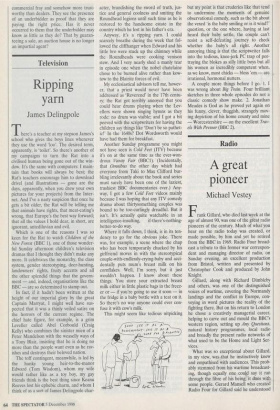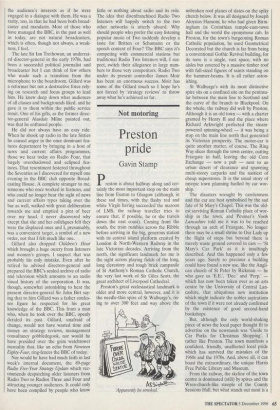Radio
A great pioneer
Michael Vestey
Frank Gillard, who died last week at the age of almost 90, was one of the great radio pioneers of the century. Much of what you hear on the radio today was created, or made possible, by him and yet he retired from the BBC in 1969. Radio Four broad- cast a tribute to this former war correspon- dent and managing director of radio, on Sunday evening, an excellent production from Bristol, written and presented by Christopher Cook and produced by John Knight.
Gillard, along with Richard Dimbleby and others, was one of the distinguished voices of wartime, covering the Normandy landings and the conflict in Europe, con- veying in word pictures the reality of the fighting there. But on his return to London he chose a creatively managerial career, helping to carve out and mould the BBC's western region, setting up Any Questions, natural history programmes, local radio and broadly the present radio networks of what used to be the Home and Light Ser- vices.
What was so exceptional about Gillard, in my view, was that he instinctively knew and empathised with audiences. This prob- ably stemmed from his wartime broadcast- ing, though equally one could say it ran through the fibre of his being; it does with some people. Gerard Mansell who created Radio Four for Gillard said he understood the audience's interests as if he were engaged in a dialogue with them. He was a rarity, too, in that he had been both broad- caster and mandarin. Most of those who have managed the BBC, in the past as well as today, are not natural broadcasters, which is often, though not always, a weak- ness, I feel.
The late Sir Ian Trethowan, an underrat- ed director-general in the early 1970s, had been a successful political journalist and broadcaster but I can think of few others who made such a transition from the microphone to the boardroom. Gillard was a reformer but not a destructive force rely- ing on research and focus groups to lead him. He knew deep down what audiences of all classes and backgrounds liked, and he gave it to them within the public service remit. One of his gifts, as the former direc- tor-general Alasdair Milne pointed out, was that he enthused people.
He did not always have an easy ride. When he shook up radio in the late Sixties he caused anger in the once dominant fea- tures department by bringing in a host of news and current affairs programmes, those we hear today on Radio Four, that largely overshadowed and eclipsed fea- tures. That resentment festered throughout the Seventies as I discovered for myself one evening in the BBC club opposite Broad- casting House. A complete stranger to me, someone who once worked in features, and who could no longer bear the sight of news and current affairs types taking over the bar as well, walked with great deliberation towards me and emptied a pint of beer over my head. I never discovered why except that she and her colleagues felt they were the displaced ones and I, presumably, was a convenient target, a symbol of a new order, not that I felt much like one.
Gillard also dropped Children's Hour which brought a huge outcry from listeners and women's groups. I suspect that was probably his only mistake. Even after he retired he advised directors-general and prepared the BBC's sealed archive of radio and television which amounts to an audio visual history of the corporation. It was, though, somewhat astonishing to hear the present director-general Sir John Birt say- ing that to him Gillard was a father confes- sor figure he respected for his great knowledge of the BBC. This from a man who, when he took over the BBC, openly derided its past. Gillard, unafraid of change, would not have wasted time and money on strategy reviews, management consultancy gobbledegook, nor would he have presided over the grim watchtower mentality that, like an echo from Nineteen Eighty-Four, ring-fences the BBC of today.
Nor would he have had much faith in last week's internal document, the 89-page Radio Five-Year Strategy Update which rec- ommends despatching older listeners from Radio Two to Radios Three and Four and attracting younger audiences. It could only have been compiled by people who know little or nothing about radio and its role. The idea that disenfranchised Radio Two listeners will happily switch to the two other networks is utterly absurd. Why should people who prefer the easy listening popular music of Two suddenly develop a taste for Britten or Schumann or the speech content of Four? The BBC says it's competing with commercial stations but traditional Radio Two listeners will, I sus- pect, switch their allegiance in large num- bers to those very competitors. Radio Two under its present controller James Moir has been an enormous success. Moir has some of the Gillard touch so I hope he's not forced by 'strategy reviews' to throw away what he's achieved so far.



















































































 Previous page
Previous page